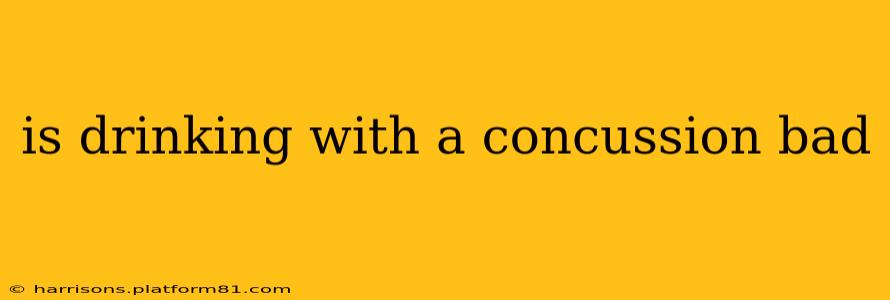Experiencing a concussion is serious, and understanding how to properly recover is crucial for your long-term health. One common question that arises is whether or not alcohol consumption is safe after a head injury. The short answer is a resounding no. Drinking alcohol after a concussion is strongly discouraged and can significantly hinder the recovery process.
Alcohol acts as a depressant, slowing down brain function. After a concussion, your brain is already working overtime to repair itself. Introducing alcohol further burdens this process, potentially leading to prolonged symptoms and even more serious complications.
Why Alcohol is Detrimental After a Concussion
Several reasons highlight the dangers of alcohol consumption following a concussion:
-
Increased Recovery Time: Alcohol interferes with the brain's natural healing process. It can prolong symptoms like headaches, dizziness, nausea, and cognitive difficulties. Your recovery will likely take longer if you drink alcohol.
-
Exacerbated Symptoms: Alcohol can worsen existing concussion symptoms. You might experience intensified headaches, increased confusion, and more severe cognitive impairment. Even seemingly mild symptoms can be significantly aggravated.
-
Dehydration: Alcohol is a diuretic, meaning it increases urination and can lead to dehydration. Dehydration can further complicate concussion recovery, as your brain needs adequate hydration to function properly.
-
Increased Risk of Bleeding: In some cases, a concussion may involve internal bleeding in the brain. Alcohol can thin the blood, potentially increasing the risk of bleeding and worsening the injury.
-
Interaction with Medications: If you are taking prescribed medication for pain or other concussion symptoms, alcohol can interact negatively, reducing the effectiveness of the medication or causing adverse side effects.
What are the Common Symptoms of a Concussion?
Recognizing the symptoms of a concussion is crucial for appropriate treatment and recovery. These can vary in severity and duration, but common symptoms include:
- Headache: A persistent headache is a classic symptom.
- Dizziness: Feeling unsteady or lightheaded is common.
- Nausea and Vomiting: These gastrointestinal symptoms are frequently reported.
- Cognitive Difficulties: Problems with memory, concentration, and decision-making are common.
- Sensitivity to Light and Sound: These sensory sensitivities can make recovery more challenging.
- Sleep Disturbances: Difficulty sleeping or excessive sleepiness.
- Mood Changes: Irritability, anxiety, or depression can occur.
- Balance Problems: Difficulty maintaining balance or coordination.
How Long Should I Avoid Alcohol After a Concussion?
There's no definitive timeframe for when it's safe to resume alcohol consumption after a concussion. It's best to completely abstain from alcohol until you're fully recovered and cleared by your doctor. This often takes several weeks or even months, depending on the severity of the injury. Your doctor will monitor your progress and advise you when it's safe to resume alcohol consumption.
What Should I Do If I Think I Have a Concussion?
If you suspect you've suffered a concussion, seek medical attention immediately. A doctor can assess the severity of your injury and provide appropriate guidance for recovery. Following their recommendations is vital for a successful recovery. Rest, avoiding strenuous activity, and avoiding alcohol are crucial steps in the healing process.
Can I Drink Caffeine After a Concussion?
While alcohol is strictly prohibited, the impact of caffeine is less clear-cut. While moderate caffeine intake may not directly harm recovery, it can exacerbate existing symptoms like anxiety and sleep disturbances in some individuals. It's best to limit or avoid caffeine until your symptoms subside and consult with your doctor regarding caffeine consumption.
What About Other Substances After a Concussion?
Similar to alcohol and caffeine, other substances like drugs (prescription or recreational) should be strictly avoided unless specifically prescribed by a physician. These substances can negatively interact with your brain's healing process and prolong recovery.
Remember, your health is paramount. Following your doctor's advice and prioritizing your recovery are crucial for a successful outcome after a concussion. Avoid alcohol and other potentially harmful substances to ensure your brain has the best opportunity to heal.
